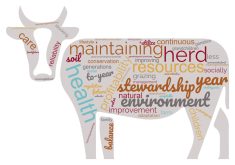The general public’s lack of agricultural knowledge is more widespread than likely imagined, according to a 2019 study.
The study by the Canadian Centre for Food Integrity (CCFI) found that 91 per cent of Canadians feel they know little, very little or nothing about modern agricultural practices. However, this research also shows that 60 per cent of Canadians are interested in knowing more about these practices.
“If three in five Canadians are interested in learning more and they claim to know very little, this is an opportunity to share exciting new technologies, best practices that farmers utilize every day and accurate nutrition information with consumers,” said Paighton Smyth, CCFI’s partner engagement co-ordinator, during a webinar outlining this research. “The more Canadians feel empowered and informed, the more they build trust in the Canadian food system.”
Read Also

Growing Canada’s beef herd: CCA’s priorities working with new federal government
This is my first column since the federal election. The Canadian Cattle Association works with all elected officials and parliamentarians, regardless…
CCFI’s 2019 research comprises three studies, one of which is based on the public trust tracking data the organization has been gathering since 2016. Surveying more than 2,000 Canadians, this research aimed to provide a better understanding of public views on the Canadian food system.
Each year, the public trust tracking research asks respondents whether or not they believe the Canadian food system is on the right track. With results almost identical to that of the 2018 data, 35 per cent of Canadians think the food system is moving in the right direction, while more than 20 per cent believe it’s going in the wrong direction.
When asked about their overall impression of agriculture, 60 per cent of respondents have an overall positive impression, rising from 55 per cent in 2018.
“There have been significant results showing a decrease in the number of people who have a negative impression, but this is directly coincided with the number of individuals who voted to say they don’t know enough to even answer the question,” said Smyth.
This study also examined perspectives on specific agricultural practices, with levels of personal concern about some practices higher than in 2018. The study found that 38 per cent of Canadians are concerned about eating food derived from genetically engineered crops, while 46 per cent are concerned about the use of hormones in livestock. As well, 46 per cent worry about the use of pesticides in crop production.

The primary concern consumers had with livestock production was “how the animals are raised and if the practices fit their expectations,” said Smyth. “A significantly higher proportion compared to a year ago agree they have no problem consuming meat, milk and eggs if the animals are treated decently.”
However, the study found that just 33 per cent of Canadians strongly feel that Canadian-produced meat comes from humanely treated animals.
Smyth noted it’s important to consider how the consumer’s limited knowledge of agriculture can result in inaccurate perceptions. For example, for someone involved in agriculture, the term “modern farming” may suggest new technologies, but this isn’t the case for the average consumer.
“Many Canadians associate modern farming with terms such as ‘factory farms,’ ‘big agriculture companies,’ ‘poor animal welfare,’ and ‘decreased food quality,’” she said. “Moving forward, the food system needs to ensure that the consumer viewpoint is understood and utilized to ensure that they’re introduced to the advancements that are being developed daily.”
Trust versus responsibility
In order to understand who in the food system is best positioned to share information on its behalf, part of this research focused on who consumers trust for information related to food and agriculture, as well as who they deem responsible for providing this information.
“We separated out these two questions because who people hold responsible is not necessarily who they trust to provide information,” said Smyth.
When asked who they consider to be most responsible for providing information on food production, Canadians chose farmers and ranchers as the most responsible, with food processors and manufacturers in second place and government and government agencies in third. When asked who they trust for information related to food production, producers were voted at the top of the list again, followed by university researchers and Canadian agriculture in general.
CCFI also wanted to find out who is considered the best source of information on nutrition issues, environmental issues, food safety issues and animal welfare issues. The top source was different for each topic, with dieticians considered the best source for nutrition issues, veterinarians for animal welfare issues, and farmers and ranchers as the best source on both environmental and food safety issues.
“When communicating with Canadians, evaluate the topic or information you’re disseminating; who could be the best person to convey the message, and who would your target audience trust the most?” said Smyth. “Utilize their knowledge on the subject, and based on how consumers responded in the research, they’re actually going to be more likely to believe the information in front of them.”
Shifting perspectives
Another component of the 2019 research explored what messages resonate with Canadians as related to the benefits of specific agricultural practices. Using artificial intelligence software, this research studied online conversations from more than 25,000 Canadian social media profiles with publicly available data.
The goal was to learn how it may be possible to shift a consumer’s perspective of a controversial practice, and this software was able to predict if a negative view could be changed to a more positive perception.
“By knowing how Canadians feel about GMOs and how they feel about food affordability, the (artificial intelligence) software can predict how a consumer might react when food affordability is used to describe a benefit of using GMO technology,” Smyth said.
“The key messages that resonated most with Canadians about GMOs was that they helped to reduce greenhouse gases and fight climate change, and that they allowed farmers to use less pesticides. The top messages for pesticides were that they had the potential to decrease exposure to food contaminated with harmful micro-organisms and could help climate change,” she continued.
“For antibiotics, messaging that they could improve food affordability and regulators assure food safety presented as messages that could shift opinions. Finally, for modern farming, wording that suggested animal welfare is highly regulated and farmers care about their animals was most successful.”
While this tool only provided predictions, it offers direction for more successful engagement with consumers.
“Overall, messaging that promotes a decrease in greenhouse gases/fights climate change has the most potential to reach the 2.5 million Canadians who are currently discussing these topics online,” said Smyth.
The full research summary can be downloaded from CCFI’s website. Graphics based on the 2019 findings are available for presentations and to share via social media. CCFI will also produce insight reports every two months in 2020, focusing on a specific topic in the Canadian food system by sharing credible information and advice on how to connect with consumers.

















